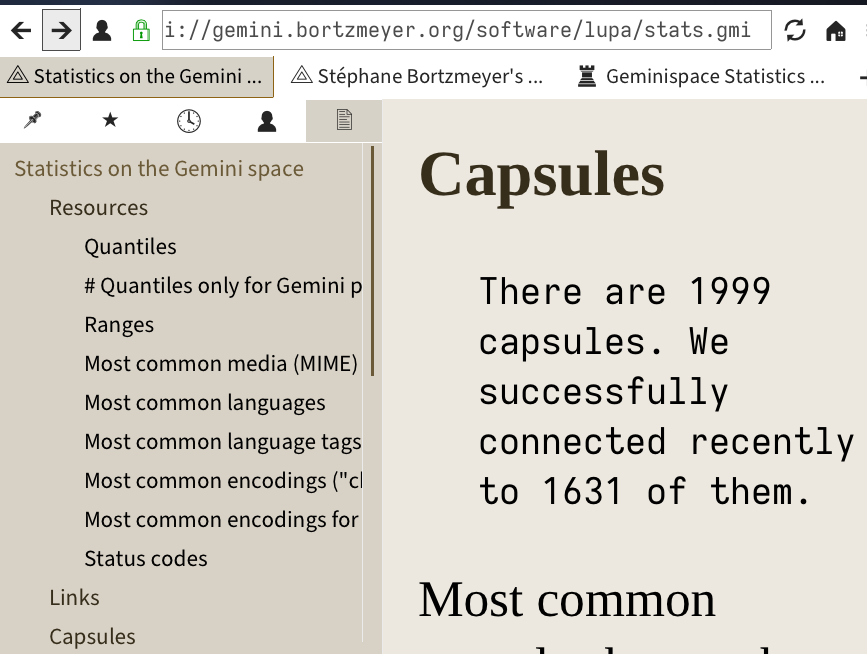
e0d854508ad66405d5dba412c27716ac
Gemini Exceeds 2,000 Capsules
Creative Commons Attribution-No Derivative Works 4.0
THIS day is important to us as we've anticipated it for a while now (we covered it yesterday and thought the milestone might be reached by the end of 2021, even as early as September). 2,000 does not mean 2,000 people; some capsules are directly used by many people (as noted in the links above), not just accessed by many people who don't have their own capsule space. So how many actual users (as in people who access the thing) are there? It's impossible to accurately measure that because of Web proxies/gateways, but probably millions of unique people have already accessed Gemini one way or another.
 At the time of making this video I saw 1,998 and then 1,999 (as shown on the right), but these latest numbers (charted visually here) suggest we've finally 'made it'... as in, we've exceeded the mentally-significant threshold, rising from 531 in January last year to over 2,000 this January. Incidentally, it's not just Gemini. the number of Diaspora servers soared to almost 650 and hopefully the 'original' pod will find a new steward (as noted in the video above; it's "work in progress").
At the time of making this video I saw 1,998 and then 1,999 (as shown on the right), but these latest numbers (charted visually here) suggest we've finally 'made it'... as in, we've exceeded the mentally-significant threshold, rising from 531 in January last year to over 2,000 this January. Incidentally, it's not just Gemini. the number of Diaspora servers soared to almost 650 and hopefully the 'original' pod will find a new steward (as noted in the video above; it's "work in progress").
The video above shows 4 different Gemini clients, including Lagrange (shown in the image). We still use Agate for hosting. Lagrange's developer has just "said goodbye to Agate as my server," based on this new update, but later on he clarified that "Agate is great for serving static files, but my needs have outgrown it. My new server is able to run CGI scripts and integrated Python "apps" for dynamic content, and supports both Gemini and Titan."
"Some teachers approach learners with tasks that utilise/leverage Gemini instead of Web "frameworks" and other unnecessary, cumbersome bloat."Lagrange has experimented with a number of advanced client- and server-side features, such as uploads and content editing. Those are innovative ideas that comply with the existing specification, albeit they rely a bit on loose and undefined ends. We've long argued that Gemini would be highly suitable for Computer Science education and be a perfect fit for programming exercises not just for college students but also pupils in schools. Based on what we've seen and heard, this is already happening. Some teachers approach learners with tasks that utilise/leverage Gemini instead of Web "frameworks" and other unnecessary, cumbersome bloat.
"The simplicity of both the Gemini protocol and Gemtext are what makes it attractive for teaching," an associate claimed some minutes ago in IRC, "for it allows the students to focus on the system." ⬆